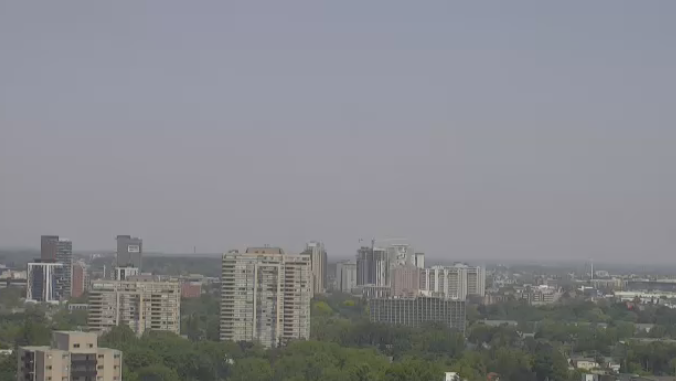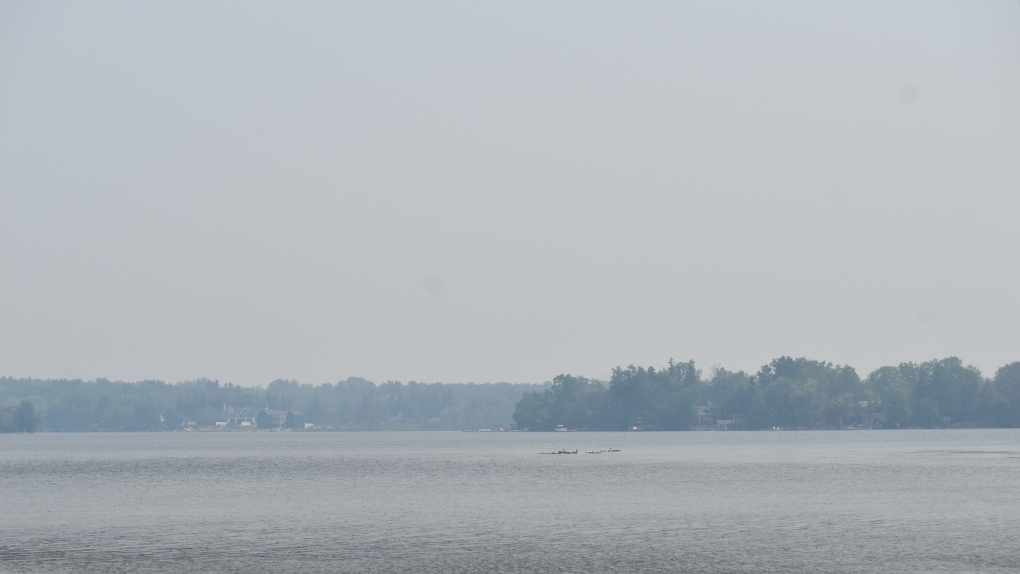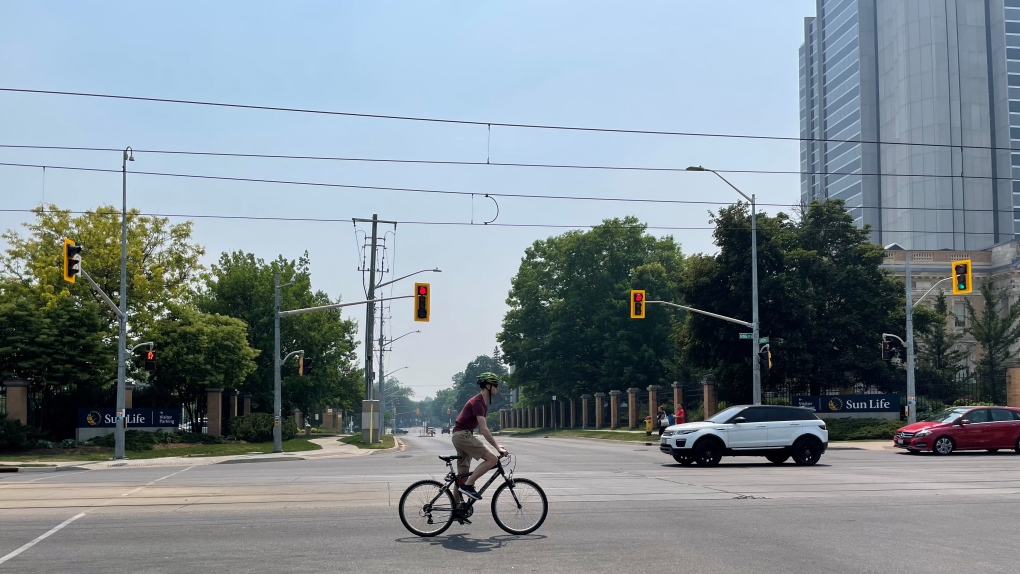Poor air quality in Waterloo region and Guelph will continue into the weekend: Environment Canada
There's high levels of air pollution in Waterloo region and Wellington County as smoke plumes from wildfires burning in Quebec and northeastern Ontario continue to blow into the region, Environment Canada says.
Both the public and Catholic school boards in Waterloo region postponed their regional track and field events scheduled for Wednesday.
The public school board said it's also advised schools to keep windows and doors closed and continue running HEPA filters.
The smoke from the wildfires, which is blanketing the eastern half of Ontario and parts of the United States, will likely continue into the weekend, according to Environment Canada.
Local air quality is expected to worsen Thursday afternoon.
There are currently more than 100 fires burning in Quebec and more than 50 burning in northeastern Ontario.
A number of burn bans are in place across Waterloo region and Wellington County.
WHAT IS THE AIR QUALITY IN KITCHENER AND GUELPH?
Air quality in Guelph deteriorated into Environment Canada’s “high risk” zone around mid-day Wednesday, registering a level 7 on the Air Quality Health Index (AQHI) between 11 a.m. and 1 p.m.
In Kitchener, the day's worst air pollution was also seen between 11 a.m. and 12 p.m., but only reached a level 6, or "moderate risk."
Air quality is expected to stay at around a level 6 in both municipalities until about 9 p.m. Wednesday when it’s forecast to improve slightly to a level 5.
 The view from the CTV News Kitchener tower on Tuesday, June 6 shows a haze over the skyline in Waterloo region as wildfires burn in northeastern Ontario and Quebec. (CTV)
The view from the CTV News Kitchener tower on Tuesday, June 6 shows a haze over the skyline in Waterloo region as wildfires burn in northeastern Ontario and Quebec. (CTV)
Environment Canada says air pollution in Kitchener and Guelph could rise to a level 8 Thursday afternoon.
On Tuesday, the AQHI briefly reached a level 8 in Kitchener around 4 p.m. before slowly dropping through overnight and into Wednesday.
STAYING SAFE IN SMOKY CONDITIONS
Seniors, young children, people who are pregnant and anyone with lung disease, asthma or heart disease should reduce or reschedule strenuous outdoor activities, Environment Canada says.
As long as the air quality remains in the moderate risk zone, the general population may continue with those activities, but should stop if symptoms like coughing and throat irritation develop.
 Hazy smoke hovering over Puslinch Lake on June 6, 2023. (Submitted)
Hazy smoke hovering over Puslinch Lake on June 6, 2023. (Submitted)
“Stop outdoor activities and contact your health care provider if you or someone in your care experiences shortness of breath, wheezing (including asthma attacks), severe cough, dizziness or chest pains. Stay inside if you are feeling unwell and experiencing symptoms,” Environment Canada’s special air quality statement for the region says.
Parents like Sarah Leighton were keeping their kids inside on Wednesday, opting instead for an indoor playground at Play a Latte in Kitchener.
“I have two kids that have asthma, and then I'm pregnant, and my 9 month old is susceptible to everything, so this is the safest space to come," Leighton told CTV Kitchener.
The local business is offering a 20 per cent discount on indoor playdates until June 17.
“I figured it's probably not good for kids, and we have the indoor space available, so I figured why not create a discount, make it a little easier for parents to come in and play," said Play a Latte owner Ronak Patel.
 Haze from wildfires burning in northeastern Ontario and Quebec can be seen in Waterloo on June 6, 2023. (Alison Sandstrom/CTV News)
Haze from wildfires burning in northeastern Ontario and Quebec can be seen in Waterloo on June 6, 2023. (Alison Sandstrom/CTV News)
Environment Canada advises keeping indoor air clean by closing doors and windows, as long as it’s not too hot inside the home. An air purifier with a High-Efficiency Particulate Air (HEPA) filter can also be used to filter wildfire smoke.
The weather agency says if you must spend time outdoors, a well-fitted respirator type mask, like an N95, can help reduce your risk of exposure to the fine particles in smoke.
CTVNews.ca Top Stories

W5 Investigates 'I never took part in beheadings': Canadian ISIS sniper has warning about future of terror group
An admitted Canadian ISIS sniper held in one of northeast Syria’s highest-security prisons has issued a stark warning about the potential resurgence of the terror group.
'Absolutely been a success': Responders looks back at 988, Canada's Suicide Crisis Helpline, one year later
In its first year, responders for Canada's Suicide Crisis Helpline, known as 988, have answered more than 300,000 calls and texts in communities nationwide.
Prime Minister Trudeau meets Donald Trump at Mar-a-Lago
Prime Minister Justin Trudeau landed in West Palm Beach, Fla., on Friday evening to meet with U.S.-president elect Donald Trump at Mar-a-Lago, sources confirm to CTV News.
Nova Scotia PC win linked to overall Liberal unpopularity: political scientist
Nova Scotia Premier Tim Houston is celebrating his second consecutive majority mandate after winning the 2024 provincial election with 43 seats, up from 34. According to political science professor Jeff MacLeod, it's not difficult to figure out what has happened to Liberals, not just in Nova Scotia but in other parts of Canada.
'Mayday! Mayday! Mayday!': Details emerge in Boeing 737 incident at Montreal airport
New details suggest that there were communication issues between the pilots of a charter flight and the control tower at Montreal's Mirabel airport when a Boeing 737 made an emergency landing on Wednesday.
Hit man offered $100,000 to kill Montreal crime reporter covering his trial
Political leaders and press freedom groups on Friday were left shell-shocked after Montreal news outlet La Presse revealed that a hit man had offered $100,000 to have one of its crime reporters assassinated.
Questrade lays off undisclosed number of employees
Questrade Financial Group Inc. says it has laid off an undisclosed number of employees to better fit its business strategy.
Cucumbers sold in Ontario, other provinces recalled over possible salmonella contamination
A U.S. company is recalling cucumbers sold in Ontario and other Canadian provinces due to possible salmonella contamination.
Billboard apologizes to Taylor Swift for video snafu
Billboard put together a video of some of Swift's achievements and used a clip from Kanye West's music video for the song 'Famous.'


































